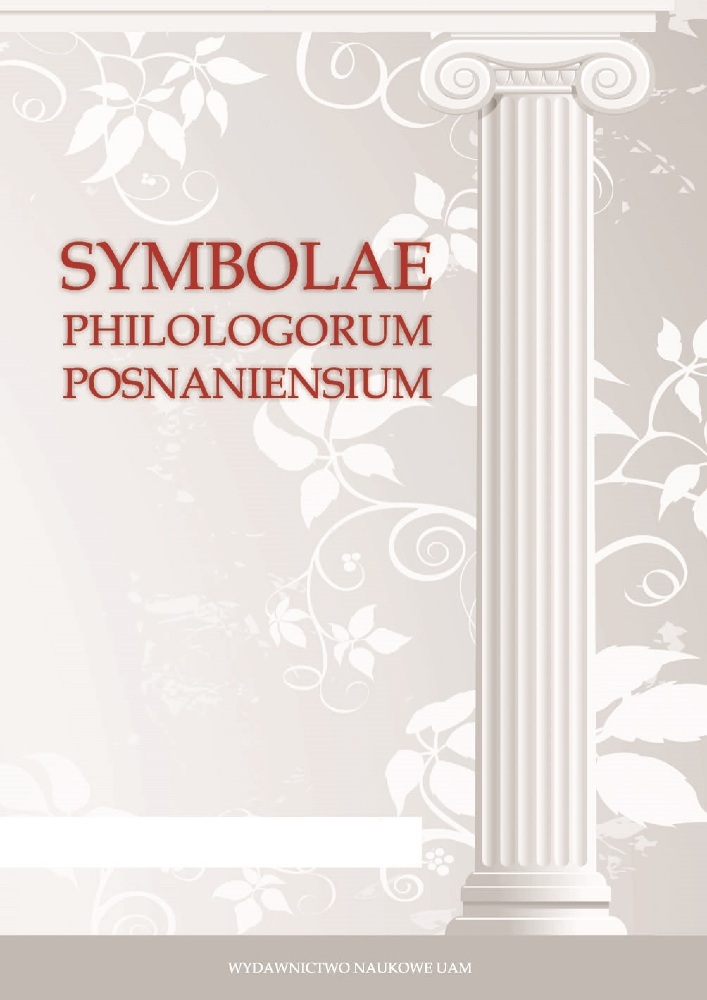Abstrakt
Fathers are important characters in the three controversies (declamations in form of fictional court speeches) analysed this article: in V declamation the father speaks against the son, demands from him financial support in poverty and old age (in one part of the declamation he even begs for his help); in VI declamation the speaker is also the father who is litigating with his wife about their deceased son’s right to be buried (the wife does not give her consent to the funeral because, according to her, the son had left her to rescue his father from pirates’ captivity); however, in XVII declamation the one who speaks is the son who is defending himself against his father’s accusations of him trying to commit patricide. The fathers presented in those declamations are characterized by some traits of personality resulting from the plot of each declamation, and are lead by certain motives of behaviour, which are love, kindness, respect, sympathy towards family members or reluctance or even hatred towards them. Simultaneously, in each of these pieces, the portraits of those fathers, emphasise dominating legal and economic position of fathers in families, their influence on upbringing and educating the children and on the family’s everyday life. This way of constructing the figure of the father in declamations resulted from the fact that those speaking exercises were performed by young Romans, who were to play the role of fathers (patres familias) in their future families. Working on the attitudes of the fathers in extreme and overstressed situations, young declaimers practiced making and justifying decisions regarding family members, public speaking in the role of fathers. What is also not out of the question is that the possibility of playing out the role of fathers or the possibility of publicly speaking against fathers (in both cases fathers could be presented in negative light) were a kind of safety valves allowing young Romans to give vent to frustrations evolving from their big dependence on the authority of fathers in real life.
Bibliografia
Beard 1993: M. Beard, Looking (harder) for Roman myth: Dumézil, declamation and the problems of definition in: F. Graf, (ed.), Mythos in mythenloser Gesellschaft: das paradigma Roms, Stuttgart 1993, 44–64.
Blomer 1997: W.M. Bloomer 1997, A preface to the history of declamation: whose speech? whose history? in: The Roman Cultural Revolution, ed. Th. Habinek, A. Schiesaro, Cambridge 1997, 199–215.
Bloomer 1997a: W.M. Bloomer, Schooling in Persona: Imagination and Subordination in Roman Education, „Classical Antiquity” 16/1 (1997), 57–78.
Bonner 1949: S.F. Bonner, Roman Declamation in the Late Republic and Early Empire, Liverpool 1949.
Breij 2009: B. Breij, Pseudo-Quinttilian’s Major Declamations. Beyond School and Literature, „Rhetorica” 27/3 (2009), 354–369.
Cantarella 2003: E. Cantarella, Fathers and sons in Rome, „The Classical World” 96/3 (2003), 281–298.
Dingel 1988: J. Dingel, Scholastica materia. Untersuchungen zu den “Declamationes minores” und der “Institutio oratoria” Quintilians, Berlin–New York 1988.
Greenidge 1901: A.H.J. Greenidge, The Legal Procedure of Cicero’s Time, Oxford 1901.
Håkanson 1986: L. Håkanson, Die quintilianischen Deklamationen in der neueren Forschung, ANRW II 32,4, 2272–2306.
Hömke 2009: N. Hömke, The Declaimer’s One-man Show. Playing with Roles and Rules in the Pseudo-Quintilian Declamationes maiores, „Rhetorica” 27/3 (2009), 240–255.
Kennedy 1972: G.A. Kennedy, The Art of Rhetoric in the Roman World 300B.C. to A.D. 300, Princeton 1972.
Marrou 1969: H.-I. Marrou, Historia wychowania w starożytności, Warszawa 1969.
Sussmna 1987: L. Sussman, The Maior Declamations Ascribed to Quintilian, A Translation, Bern–New York 1987.
Sussman 1995: L. Sussman, Fathers and Sons in the Major Declamations Ascribed to Quintilian, „Rhetorica” 13/2 (1995), 179–192.
Winniczuk 1983: L. Winniczuk, Ludzie, zwyczaje i obyczaje starożytnej Grecji i Rzymu, Warszawa 1983.
Winterbottom 1974: M. Winterbottom, Seneca the Elder, Declamations, volume I, with an English Translation by M. Winterbottom, Loeb 1974.
Winterbottom 1974a: M. Winterbottom, Seneca the Elder, Declamations, volume II , with an English Translation by M. Winterbottom, Loeb 1974.
Winterbottom 1984: M. Winterbottom, The Minor Declamations Ascribed to Quintilian, edited and Commentary by Michael Winterbottom, Berlin–New York 1984.
Wołodkiewicz 1986: W. Wołodkiewicz, Prawo rzymskie. Słownik encklopedyczny, red. W. Wołodkiewicz, Warszawa 1986.
Zabłoccy 2003: M. i J. Zabłoccy, Ustawa XII tablic. Tekst – tłumaczenie – komentarz, Warszawa 2003.
Zinsmaier 1993: T. Zinsmaier, Der von Bord geworfene Leichnam: die sechste der neuzehn größeren Deklamationen, Einleitung, Übersetzung, Kommentar, Frankfurt am Main 1993.
Zinsmaier 2009: T. Zinsmaier, Zwischen Erzählung und Argumentation: colores in den pseudoquintilianischen Declamationes maiores, „Rhetorica” 27/3 (2009), 256–273.
Licencja
